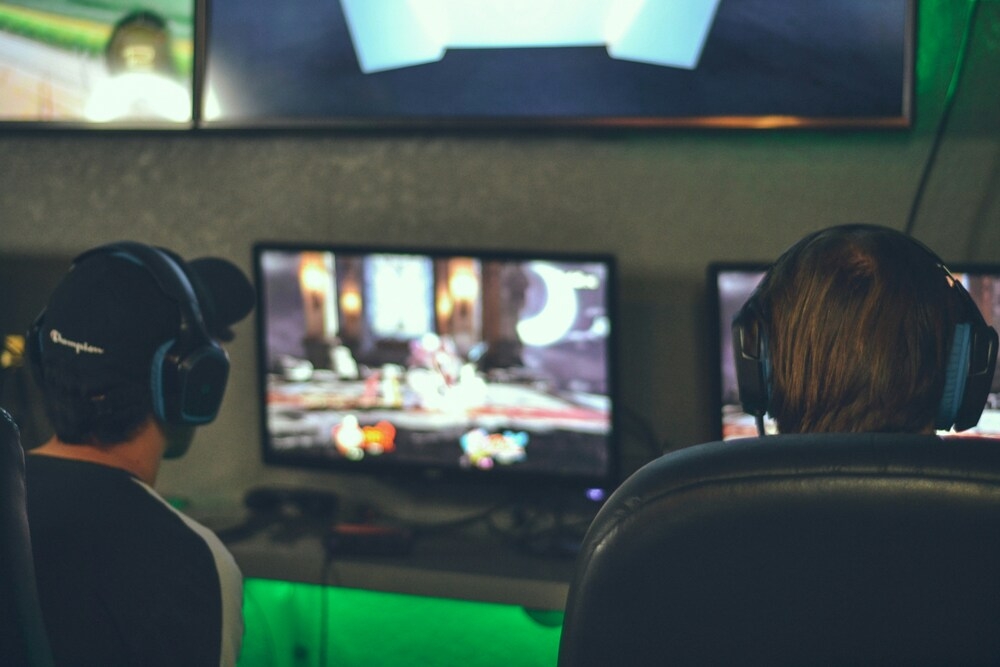Non Copyright Music for Gaming Video / montages / intro
Unlock the secret to captivating gaming videos! Discover how to enhance your content with the perfect non-copyright music, navigate legal waters, and stand out. Dive into our guide now and elevate your gaming creations!
There's more music!
That's only the tip of the iceberg. We have many more songs, all available with our lifetime licenses:
Why you should purchase from us
Discover the simplest and most cost-effective way to secure a lifetime license – pay once and never worry about account creation or password hassles again! Our licenses are your ticket to the best music, valid for any project, forever.
Get your license now!Use our music on...
Music Plans
Pay once, use for a lifetime
You’ll never have to worry again about copyrights or claims.
Starter
Suited for personal projects and social media (Youtube not included)
$49 / forever
Buy plan- Personal projects
- Social Media
- Clients work
- Online Advertising
- TV, Cinema and Radio
Personal
Most popular
Ideal for Youtube. apps, podcast and gameplays. Unlimited downloads and channels.
$99 / forever
Buy plan- Social Media
- Youtube & Streaming
- Apps & Videogames
- Clients work
- Online Advertising
- TV, Cinema and Radio
Business
Ideal if you're a freelancer or a business. All covered, unlimited downloads and channels
$199 / forever
Buy plan- Any Possible Use Case
- Clients work
- Online Advertising
- TV, Cinema and Radio
👉No need to create an account
👉A lifetime license, forever
👉No more ‘clearing’ channels
We currently offer 241 songs from 30 different genres
Testimonials
Don't take our word for it
“I was skeptical at first but Legis Music has exceeded my expectations. Their music library is diverse and constantly updated, making it easy to find the perfect track for any project. Plus, the peace of mind that comes with that royalty-free license is priceless.”

“@legismusic has made my life as a video editor so much easier. The lifetime license is a no-brainer and the fact that I don’t have to worry about clearing channels or getting copyright strikes is a huge weight off my shoulders. The affordable cost and extensive music library make it the go-to source for all my music needs.”

“As a podcast creator, finding the right music to complement my content can be a challenge, but Legis Music has made it so easy. Their lifetime licenses are affordable and the fact that I can use the music on Spotify and Apple Music is a huge relief. A no-brainer for any podcaster.”

“I was blown away by the value offered by Legis Music's lifetime royalty-free licenses. The cost is incredibly affordable and having the peace of mind to use the music for my clients without worrying about copyright strikes is priceless. I highly recommend this to anyone in need of music for their projects.”

“It was important for me to find a cost-effective solution for my company’s music needs. Legis Music’s business plan was the perfect fit and the lifetime licenses have been a game-changer. We can now use the music for all of our projects without any worries about copyright strikes. Highly recommend to any business in need of music.”

“The quality of the music is top-notch, and the licensing terms are crystal clear, saving me from any copyright hassles.”

“Legis Music has improved the way I create content. The selection of royalty-free music is great and the quality is unbeatable. I can now add the perfect sound to my videos without any stress or added costs. Highly recommended!”

“I've been using Legis Music for my YouTube channel for the past few months, and I couldn't be happier with the service.”

“As a video game creator, having access to high-quality music for my games is crucial. @legismusic lifetime licenses are a steal and the fact that I don’t have to worry about any type of copyrights in the future is a huge relief. The extensive library makes it easy to find the perfect tracks for my games.”

“The audio quality is excellent, and I've never experienced any copyright issues since using their music. The licensing terms are transparent, which is essential for content creators like myself.”

“As a freelance producer, I need to keep costs down and Legis Music has been a huge help for me. The user-friendly platform and affordable pricing make it easy for me to access top-notch music for my clients. Anyone in need of royalty-free music should give it a shot.”

Key Takeaways
- Legal foundations: Discusses the importance of understanding copyright laws, Creative Commons licenses, and the distinction between different types of free-use music.
- Types of non-copyright music: Describes the various kinds of music suitable for gameplays, montages, and intros, highlighting the need for choosing music that complements the video content.
- Sources of non-copyright music: Lists potential sources for finding suitable music, including online platforms, independent musicians, and creating original compositions.
- How to use non-copyright music: Offers advice on selecting music, ensuring proper attribution, and avoiding copyright claims by adhering to usage guidelines.
- Technical aspects of music in gaming videos: Covers the technical considerations for integrating music into videos, such as editing, synchronization, and sound quality optimization.
- Challenges and future considerations: Looks at the evolving landscape of copyright laws, emerging trends, and technological advances affecting the use of music in content creation.
In the realm of gaming content creation, music plays an indispensable role in setting the tone, enhancing the atmosphere, and engaging the audience.
However, navigating the complexities of copyright law can be a daunting task for content creators.
This is where non-copyright music, also known as royalty-free or copyright-free music, becomes a game-changer.

Definition of non-copyright music
Non-copyright music refers to tracks that are free to use without the need to pay royalties or face legal constraints typically associated with copyrighted works.
This does not necessarily mean the music is in the public domain, but rather it may be offered under licenses that allow for its free use under certain conditions, such as attribution to the original artist.
Importance of music in gaming videos, montages, and intros
Music is not just a background element; it is a powerful tool that can evoke emotions, highlight moments, and create a memorable identity for gaming channels.
In gameplay videos, the right soundtrack can enhance the excitement and intensity of the action.
For montages, music can dictate the pace and rhythm, turning a series of clips into a cohesive and compelling story.
In intros, a signature tune can quickly become synonymous with a channel’s brand, helping to build a loyal viewership.
The choice of music is crucial in achieving the desired impact on the audience.
Non-copyright music offers a diverse palette of genres and styles, freeing creators from the limitations and concerns of copyright infringement.
By leveraging these musical resources, creators can focus on crafting content that resonates with their audience, enriches the viewing experience, and stands out in a crowded digital landscape.
Legal Foundations
Understanding the legal framework surrounding music in digital content is crucial for content creators.
It not only helps in complying with the law but also in respecting the rights of creators and artists.
Copyrights in music
Copyright law protects the original works of artists, including musicians, composers, and lyricists.
When music is copyrighted, it means the creator holds exclusive rights to its use, reproduction, and distribution.
Content creators need to obtain permission or licenses to use such music in their videos, which can often involve fees or royalties.
Non-copyright music and its legal basis
Non-copyright music, often available under terms that allow for its free use, comes primarily in two forms: Creative Commons licenses and royalty-free music .
Creative Commons licenses provide a standardized way for creators to grant permission for others to use their work, sometimes requiring attribution or limiting use to non-commercial projects.
Royalty-free music, on the other hand, may require a one-time payment but typically does not involve ongoing royalties, making it an attractive option for content creators.
Creative Commons and other free licenses
Creative Commons licenses offer different levels of freedom, from allowing any type of use with attribution to restricting commercial use or modifications.
Understanding these licenses is essential for content creators to ensure they adhere to the conditions set by the music’s creator.
Types of non-copyright music
The diversity of non-copyright music ensures that content creators can find the perfect track to match the mood, theme, and pace of their gaming videos, montages, or intros.
Music for gameplay background
Choosing the right background music for gameplay videos is vital.
It should enhance the gaming experience without overshadowing the game’s own sounds and commentary.
Genres like electronic, ambient, or orchestral music are popular choices, offering a range of emotions from excitement to calmness.
Dynamic music for montages
Montages require music that can adapt to the changing pace and intensity of the video content.
Upbeat and dynamic tracks work well in highlighting epic moments, while more subdued music can underscore strategic or emotional segments.
The key is to select music that complements the video’s narrative flow.
Introductory themes and sonic identity
An intro theme is more than just the first few seconds of a video; it’s a sonic handshake with the audience.
It should be memorable and reflective of the channel’s identity.
Short, catchy tunes work best, creating a brand recall that viewers can instantly recognize.
Sources of non-copyright music
Identifying reliable sources for non-copyright music is a cornerstone of creating engaging and legally compliant content.
There’s a wealth of resources available, each offering a diverse array of music to suit any content creator’s needs.
Online platforms and libraries
Many online platforms and libraries specialize in providing royalty-free music.
These websites host a vast collection of tracks across various genres, often curated to meet the specific needs of content creators.
Some popular platforms include:
- YouTube Audio Library : A free resource offering a wide range of music and sound effects for content creators to use in their YouTube videos.
- SoundCloud : Some artists on SoundCloud offer their music under Creative Commons licenses, allowing for use in projects with proper attribution.
- Free Music Archive : An interactive library of high-quality, legal audio downloads directed by WFMU, the longest-running freeform radio station in the United States.
Independent musicians and composers
Engaging with independent musicians and composers can be a mutually beneficial approach.
Many artists are open to licensing their music for use in videos, sometimes in exchange for attribution or a one-time fee.
This not only provides content creators with unique music but also supports the artists’ exposure and growth.
Creating original music
For those with the capability, creating original music for videos is a surefire way to avoid copyright infringement while adding a unique touch to content.
This approach allows for total creative control over the music’s mood, style, and integration with the video.
How to use non-copyright music
Simply finding non-copyright music is not enough; knowing how to use it correctly is key to avoiding legal issues and respecting artists’ rights.
Searching and selecting the right tracks
Content creators should consider the tone, pace, and theme of their video when selecting music.
It’s important to read and understand the terms of use for each track, as some may require attribution or have restrictions on commercial use.
Correct attribution
When required, proper attribution ensures respect for the original artist’s work and keeps creators on the right side of copyright law.
An attribution should typically include the track title, artist’s name, source, and mention of the license under which it is used.
Avoiding copyright claims
Even with royalty-free or Creative Commons music, it’s possible to face copyright claims if not used correctly.
Ensure that any music used is genuinely free for commercial use if applicable and that any required attributions are made. Keeping records of licenses and permissions can also be helpful in resolving any disputes.
Technical aspects of music in gaming videos
The effective use of music in gaming videos involves more than just selecting the right tracks; it requires a thoughtful integration process that considers timing, volume, and the overall mix with game sounds and commentary.
Editing and synchronization
Editing music to fit the flow of the video is crucial.
This may involve trimming tracks, fading in and out, or **even syncing specific beats with on-screen action to enhance the viewing experience. **
Software like Adobe Premiere Pro, Final Cut Pro, or DaVinci Resolve offers advanced audio editing features that can help creators achieve seamless integration.
Sound quality optimization
High sound quality is essential for keeping viewers engaged.
Creators should ensure that the music they use is of high quality and that the final audio mix does not clip or distort.
Balancing the music with in-game sounds and commentary is also crucial, ensuring that neither overshadows the other.
Recommended tools and software
Several tools can help in the process of integrating music into videos:
- Audacity : A free, open-source audio editing software that’s great for basic edits and sound adjustments.
- FL Studio : While primarily a digital audio workstation (DAW) used for music production, FL Studio can be useful for creating custom music or edits.
- Ableton Live : Another DAW that’s excellent for more complex music production and edits, allowing for creative control over the music in your videos.
Conclusion
The strategic use of non-copyright music in gaming videos, montages, and intros offers a pathway for content creators to enhance their work, engage their audience, and navigate the complex world of copyright laws.
From understanding the legal foundations and sourcing the right music to integrating it seamlessly and contemplating future challenges, there’s a vast landscape to explore.
Content creators are encouraged to dive into this world with respect for copyright laws and an appreciation for the artists whose music they use.
By doing so, they not only enrich their own content but also contribute to a culture of creativity and innovation in the digital space.
The journey of creating compelling gaming content is both challenging and rewarding.
Armed with the right knowledge and resources,** creators have the opportunity to craft videos that captivate and inspire. **
As the digital ecosystem continues to evolve, so too will the ways in which music and content come together to create unforgettable experiences.